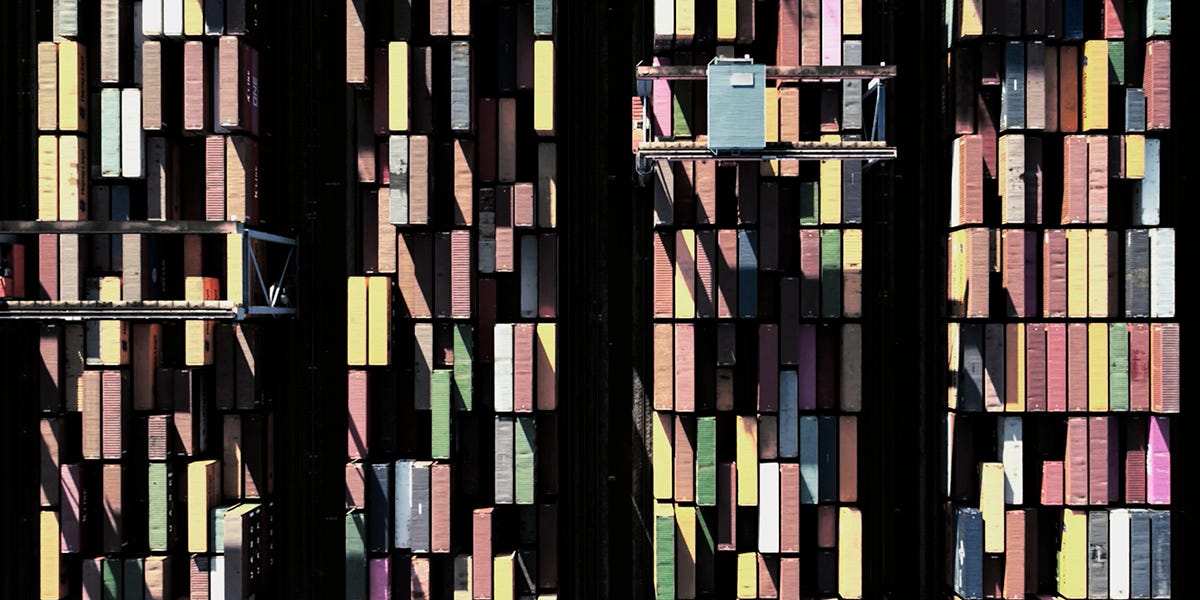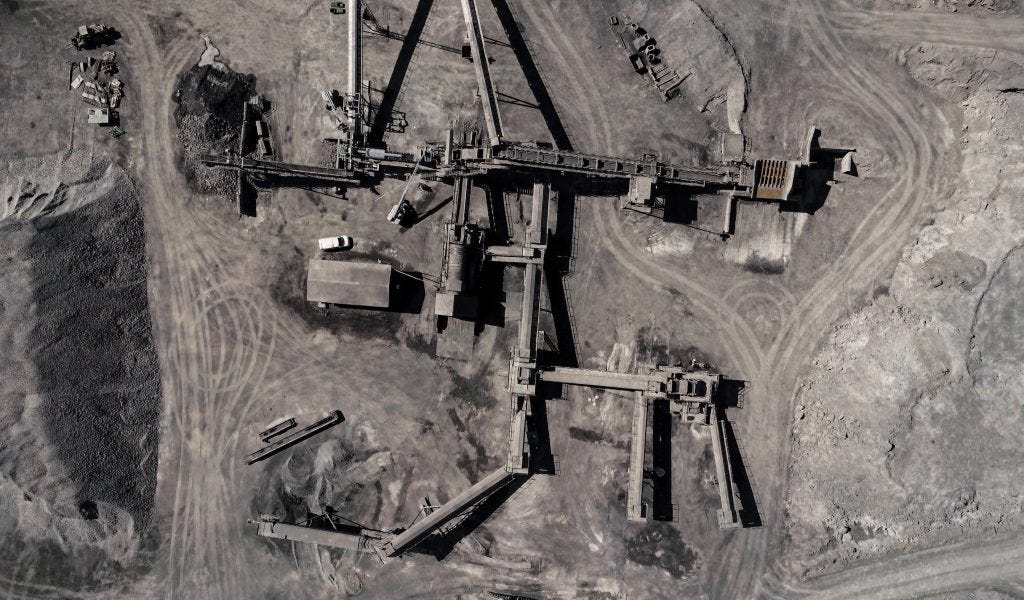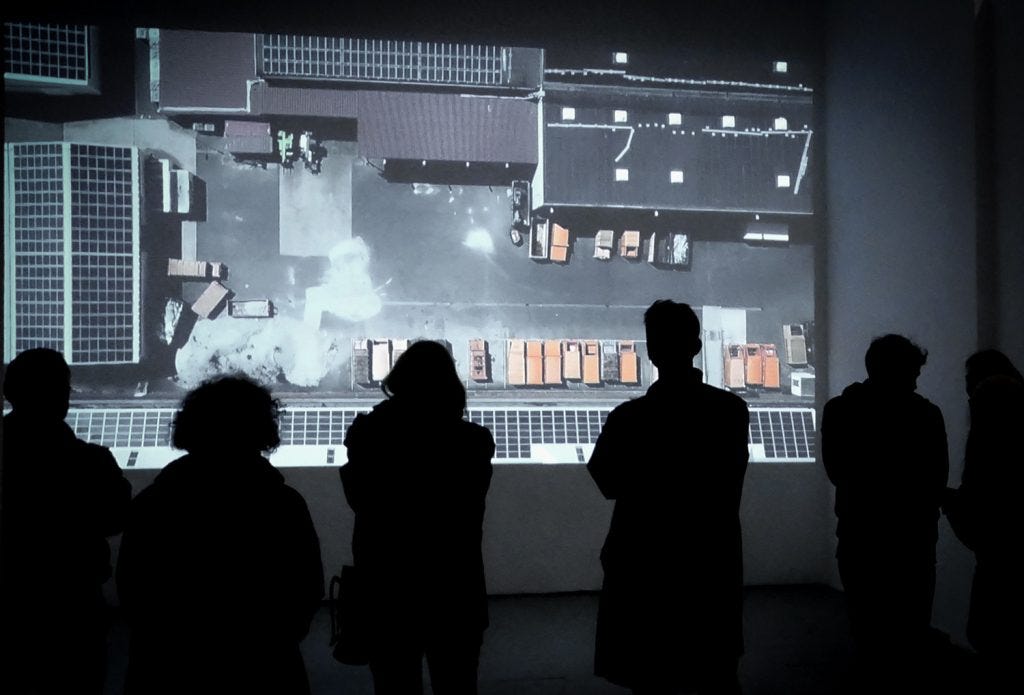At our exhibition as part of the "transmediale Vorspiel," we invited and interviewed Marcelina Wellmer. The artist behind the work "Solid Landscapes" from 2022 is a photographer and multimedia artist. Below is an excerpt from the interview.
CAC: What is your climate change story? When did you realize that climate change is socially relevant? And when did it become part of your art? When did you understand that it might even be a threat?
Marcelina: It actually became clear to me as a personal threat. That wasn't too long ago, it actually started in 2018. When I saw the forest completely drying out - during the first heatwave year. I often went to the forest with my dog and also as a child in Poland. Forests are super sacred places for me, where I feel good. And then the forest was somehow like dead in July. And everything was dried out, charred, and also very quiet because it was too warm for the birds. I had never seen that before. Then the next year came, and it was the same. And then the next year, it was the same again.
It's very personal. But even the dog didn't want to walk anymore. There was no winter. Animals that usually hibernate didn't sleep.
That's been going on for 2-3 years now.
CAC: And when did climate change become relevant in your work?
Marcelina: I think 2020. Before, I made art in the style of "transmediale" - a bit cynical or joked about technology. Over the years, I realized that through the 10 years of my artistic work, I have a stock with a lot of technology that is already partly very outdated and no longer works.
And then I thought, what do I do with it now? Update it, repair it? Should I drive to the recycling center with all this stuff? And all of this was produced somewhere with rare earths and comes from China or who knows where. And that was the moment when I thought: Now I've had enough of this technical dependence.
CAC: The work we see behind us was filmed in Sweden and Germany. Can you tell us a bit about the creative process - how did you film, how did you find the locations?
Marcelina: Another personal story - after this whole phase of technology, I was looking for something that relates to my old work. I also wanted to be much more outdoors and much less busy soldering in my studio. And then Corona came, and there wasn't much to do. My boyfriend and I thought - let's go outside and we converted a small van for that purpose.
I thought - I always did something with technology. I can't get away from it completely. I bought a drone and started flying it a bit in Berlin - that was 2020.
Almost accidentally - I have always been interested in industrial production - we discovered a recycling center near Berlin. And then we really saw what it looks like in there - the garbage and also water forming puddles in different colors.
It's very "trashy" and has not much to do with all this great technology that we see as a product - the final phase is really anything but beautiful and shouldn't be seen either.
CAC: Did you need permission to film?
Marcelina: We just did it in Germany because, as experience shows, you never get permission anyway. I tried it a few times, it never worked - we thought - probably not without reason. It's always about private landscapes, even though it's just leased pieces in the forest - and you can't look into them - but we as humans, citizens, consumers, we should see that - that was the beginning of the project.
Over time, the concept for the film developed - the path from the container with the finished product, to the production site, and before that, extracting the material from the earth.
CAC: We are here at the transmediale, and you have always worked a lot with media, and you are also very critical that we are so dependent on technologies. Could you elaborate on that?
Marcelina: Yes, I think humans like to get into dependencies anyway, and this is one of those dependencies. I'm just for reflecting on it and not fetishizing it as something that saves us.
Technology certainly doesn't save us in any way and doesn't make us happy either. I think you have to gain some distance from it and look at technology as a whole, so how it's made and how it's changing.
CAC: Would you also say that we should regress into a less technologized world to prevent such landscapes (as shown in "Solid Landscapes")?
Marcelina: There's no going back - I might wish for it, but probably hardly anyone else wishes for it either. There's no going back, but you can design technologies very differently - less mass, higher quality.
Such places (points to the footage) are always based on lower cost - having low costs to sell as expensively as possible.
Such things simply need to be controlled by society and must be more transparent. If you constantly want to buy something new, which then breaks and you can't repair it, then more and more resources are consumed, and I am in favor of only being able to buy high-quality and repairable things when buying.
The more we consume, the more landscape consumption there is.
CAC: Would you say you're an artivist?
Marcelina: With the old projects, I wouldn't describe myself like that - maybe an ecologist. There are people who do really great things as activists and influence a lot. And I want to awaken, on a slightly metaphysical level, that shakes you up a bit with images.
But in the new works, including my new exhibition, which takes place in April, there are a bit more activist references - that means, I try to change something physically. It's about pollution of waters.
I may comment on the times in which I live.
The landscape is important to me - the one we know is simply being changed so drastically, and so much more is taken than we have. There in the north (points to a segment from the work), many Sami live, there are reserves. But only as long as no raw materials are found there.
I visited the people there during an artist residency in an art hall up north. They always fight to preserve these areas for the reindeer - we have to think of all that when we decide on the next phone again - they always have to keep digging there - and it becomes like this -(points to the canvas) a dry hole.
And the most important thing is - steel production currently produces the most CO2 in Europe. And when we talk about climate here, we also have to think about that.
Furthermore, the audience had the opportunity to ask the artist questions:
Listener: Have you also changed anything privately since 2018?
Marcelina: Yes, especially from 2020, maybe also because of all the time during Corona, I changed my behaviour quite a lot. Above all, I stopped making art for which you always buy new things and then experiment. Sometimes it succeeded, sometimes not, sometimes it stayed in my storage, sometimes I showed it. I really changed that. I do much more with photography and video now, just working with one device.
And then I definitely changed my buying behavior. I tried to go for sustainable food and sustainable fashion. In general, products that I can use for a longer time and repair. When I wanted to buy something, I started researching like crazy - can I still buy this? Is it produced somewhat sustainably?
You don't always succeed. It costs a lot of money - As an artist, you have little money. There are, of course, limits for me. But you don't always have to act so exaggeratedly. At some point, you get tired or totally frustrated - in my opinion, you should try to live sustainably where you really CAN. You have to say that these very ecological things are often really expensive. And you have to somehow look at what is possible.
Same listener: Then, if I may - you said you're not an artivist - I'm really glad about that because I don't like that term at all - when one sees your art - do you have a thought or a hope of how it can be picked up by the viewer? What is your wish for the audience?
Marcelina: That's so hard. I don't really formulate wishes to the audience, but I think it's my first artwork that touches a bit more emotionally. It's good if there's a visual and emotional impulse - nothing more. So, I'm not running a workshop here on how to live sustainably or how to behave or what to think. Realistically, that's not possible - but, I like it when it doesn't leave one cold.
Listener: You said that you sometimes didn't have permission. Were there also incidents where you had to bring the drone down?
Marcellina: No, that never happened, but there was an unpleasant incident with security and the police - where we really played theater that we were doing something else. And it was also my bad idea's fault. I wanted to film in Schwerin in that refinery.
And that was a week after the war broke out in Ukraine. I didn't know that it also belongs to Rosneft to 80% or so.
There were a lot of people from Berlin there to protest, and one day, the people chained themselves to the entrances, and we were somewhere in the back of the forest, and - we always did it like this - had a cup of tea and walked the dog, although it was a very ugly little forest. But still, there was someone who watched us the whole time, and then he came to us and quasi drove us away, and then the police also drove behind us for a long time. So much so that we really had to leave the premises. We also flew the drone there - there were very big signs - "No Photography" and we were really a bit scared that we would get a fine.
And in Sweden, no one cared - Nobody - we had permission from people from the art hall, and we were standing there in the parking lot in front of the entrance and filmed for the whole day. Sometimes someone looked, but nobody asked us even once. That's already a very big difference.
CAC: Thank you for the conversation!








